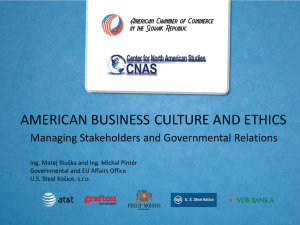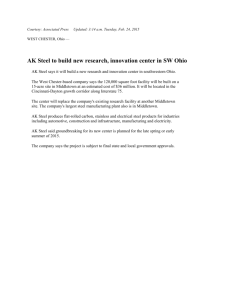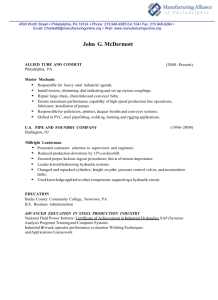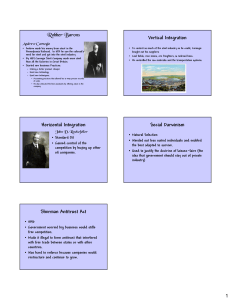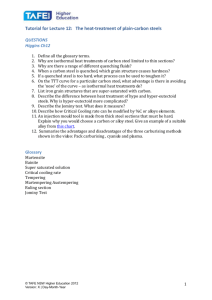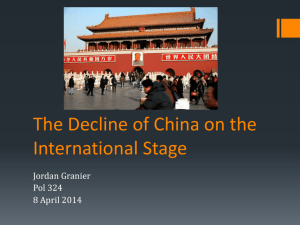(c) crown copyright Catalogue Reference:CAB/129/156/13 Image Reference:0001
advertisement
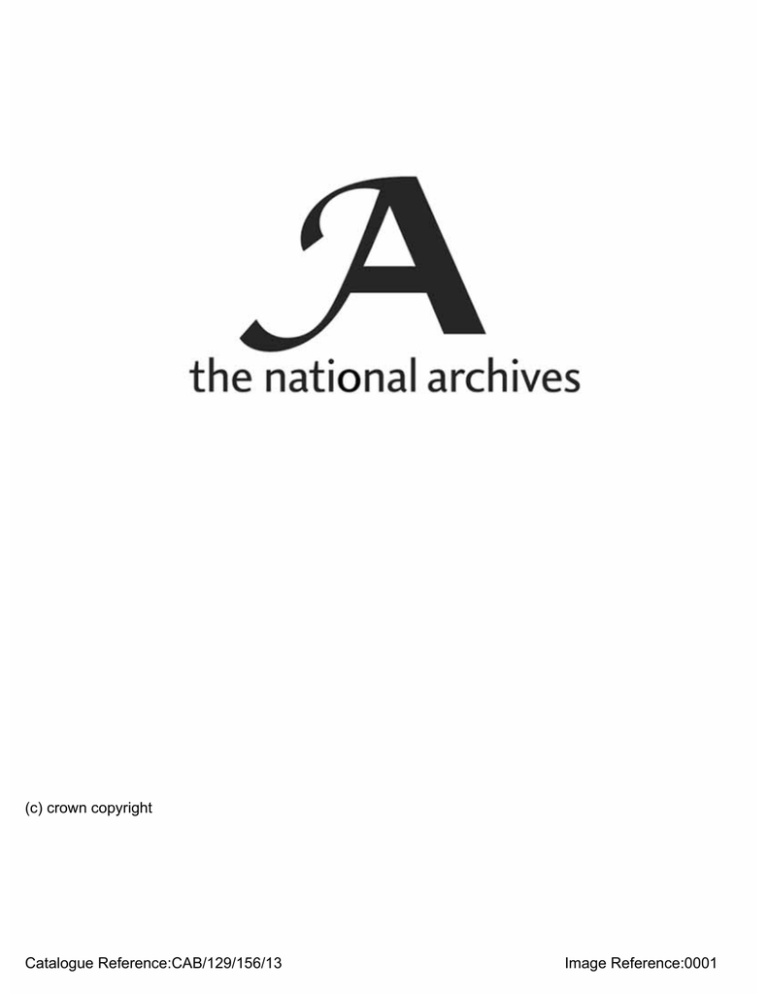
(c) crown copyright Catalogue Reference:CAB/129/156/13 Image Reference:0001 THIS D O C U M E N T IS T H E P R O P E R T Y O F H E R B R I T A N N I C M A J E S T Y ^ S C P ( 7 1 ) 38 GOVERNMENT COPY NO 62 22 M a r c h 1971 CABINET S T R U C T U R E OF T H E S T E E L , I N D U S T R Y M e m o r a n d u m b y the S e c r e t a r y of State f o r Trade and I n d u s t r y 1. A t C a b i n e t on 18 M a r c h ( C M ( 7 1 ) 15th C o n c l u s i o n s , M i n u t e 10) I r e p o r t e d that the M i n i s t e r i a l C o m m i t t e e on E c o n o m i c P o l i c y h a d a g r e e d in p r i n c i p l e that the b a s i c i r o n a n d s t e e l m a k i n g c a p a c i t y of the B r i t i s h S t e e l C o r p o r a t i o n ( B S C ) s h o u l d not be splits a n d that I w i s h e d to m a k e a n e a r l y announcement accordingly,, 2. T h i s l a t t e r is e s s e n t i a l to m a i n t a i n m o r a l e in the i n d u s t r y n o w that m y f u n d a m e n t a l r e v i e w of B S C f i n a n c e a n d d e v e l o p m e n t h a s b e e n a n n o u n c e d . T h e text at A n n e x A i s c o n s i s t e n t w i t h o u r p o l i t i c a l c o m m i t m e n t s ( A n n e x B ) and a l l o w s c o n s i d e r a b l e f l e x i b i l i t y in the f u t u r e to s e c u r e a p r o g r e s s i v e r e d u c t i o n of the B S C * s i n v o l v e m e n t w h i l e c a r r y i n g n o I m p l i c a t i o n a s to the e v e n t u a l size of the i n d u s t r y , 3. M y r e c o m m e n d a t i o n that the B S C should not b e split f o l l o w s a v e r y c a r e f u l study of the i s s u e s i n v o l v e d and e x t e n s i v e c o n s u l t a t i o n w i t h the private sector which has strongly argued for stability. 4. On the one h a n d the c a s e f o r a s p l i t s t e m s f r o m the v i e w that n a t i o n a l i s a t i o n a r b i t r a r i l y c r e a t e d a m o n o p o l y u n r e s p o n s i v e to c o n s u m e r s w i s h e s . , d i f f i c u l t to m a n a g e e f f i c i e n t l y and n o w m a k i n g e x c e s s i v e d e m a n d s on p u b l i c i n v e s t m e n t f u n d s . 5 5, On the o t h e r hand s t e e l c o m p a n i e s t h r o u g h o u t the w o r l d a r e 3 rapidly g r o w i n g b i g g e r and a l r e a d y U n i t e d S t a t e s S t e e l a n d N i p p o n S t e e l m a k e l a r g e r t o n n a g e s than B S C w h i l s t s e v e r a l c o m p a n i e s h a v e s i m i l a r m o n e y turnover. T h e s l o w g r o w t h of d e m a n d i n G r e a t B r i t a i n m e a n s that only w i t h one c o m p a n y c a n w e d e r i v e the g r e a t e s t t e c h n o l o g i c a l a d v a n t a g e of s c a l e w h i l s t p l a n n i n g c l o s u r e s of old and inefficient p l a n t with due r e g a r d to r e g i o n a l a n d e m p l o y m e n t c o n s i d e r a t i o n s . C o m p e t i t i o n f r o m E u r o p e and Japan i s i n c r e a s i n g and w i l l i n t e n s i f y if w e j o i n the C o m m u n i t y . 1 6. A l l of the p o s s i b l e w a y s in w h i c h fche B S C might b e split ( e g b y P r o d u c t D i v i s i o n o r g e o g r a p h i c a l l y Norths-South) have s e r i o u s p i a c t i c a l d i f f i c u l t i e s in h a n d l i n g both d e v e l o p m e n t and c l o s u r e s ? and w o u l d i n e v i t a b l y d i s l o c a t e f i n a n c i a l and c o s t c o n t r o l at a time w h e n e v e r y t h i n g m u s t b e done to i m p r o v e it. M o r e g e n e r a l l y , they w o u l d a c c e n t u a t e uncertainty., g e n e r a t e p o l i t i c a l c o n t r o v e r s y and r i s k t h r e a t s of r e v e r s a l b y the O p p o s i t i o n . In m y v i e w n o spl?t w h i c h d o e s not i n v o l v e s e r i o u s and o v e r r i d i n g p r a c t i c a l d i f f i c u l t i e s w o u l d induce a g r e a t e r d e g r e e of c o m p e t i t i o n into the i n d u s t r y . CONCLUSION 7. I s e e k m y c o l l e a g u e s a g r e e m e n t to a n e a r l y s t a t e m e n t on the l i n e s of A n n e x A . T h i s w i l l e n c o u r a g e m o r a l e and s t a b i l i t y i n the i n d u s t r y d u r i n g m y c u r r e n t r e v i e w of B S C f i n a n c e and d e v e l o p m e n t and w i l l not c o m p r o m i s e o u r o t h e r o b j e c t i v e s on w h i c h I w i l l r e p o r t f u r t h e r a s n e c e s s a r y i n due course. 1 8. B S C t h e m s e l v e s h a v e p r o p o s e d that our a i m s m i g h t b e a c h i e v e d b y e s t a b l i s h i n g t h e m intact a s a c o m p a n y u n d e r the C o m p a n i e s ' A c t . Without r u l i n g this out f o r the l o n g e r t e r m I a m s a t i s f i e d that w i t h t h e i r f i n a n c i a l d i f f i c u l t i e s it w i l l not m a k e s e n s e f o r s o m e y e a r s . J D D e p a r t m e n t of T r a d e and I n d u s t r y SW1 22 M a r c h 1971 2 Annex A DRAFT STATEMENT ON STEEL POLICY As the House is aware, I have been carrying out a full review of the existing and future structure of the Corporation in parallel with the review of nationalised industry activities more generally which is still continuing. I make no apology for taking time to examine all the issues properly instead of rushing into premature decision. After a most careful examination with the Corporation the private sector of the industry and others concerned we have decided against splitting the Corporation^ hulk iron and steel activities, though the question of the future size of the industry is for consideration within my current review of the Corporation^ financial and development position. Within this area we shall continue to explore with the Corporation the scope for continuing progress towards greater efficiency and competit­ ive discipline. This of course must he subject to the constraints of fair competition with the private sector and the need for a rapid improvement in the Corporation^ financial position; it is also subject to the Government's overall policy for the economy. The nationalisation of the industry created a number of anomalies on the boundary between the public and private sector and we intend to pursue with the Corporation and with the private sector interests concerned the extent to which these can be remedied. There are clear areas here where sensible rationalisation is possible and we shall encourage the BSC and the private sector interests to seek appropriate solutions. The Corporation a].so has interests in a wide range of diversified, and ancillary activities; now that we have taken the main decision on bulk steel making our close examination of these other activities can proceed apace. I might add that we would welcome any new private sector steelworks developments and I should like to make clear that I would not normally expect to use my statutory powers (S.15 of the 1967 Act: approval needed for carbon steelmaking over 100,000 tons; and alloy steelmaking over 20,000 tons) of approval of such steelmaking development in any restrictive way. I shall of course report further to the House when my considerations of policy and the necessary consultations have been completed. ANNEX B STATEMENTS OF CONSERVATIVE POLICY ON THE FUTURE STRUCTURE OF THE STEEL INDUSTRY r Pre-Election The Campaign Guide 1970 stated that "The Conservative attitude to steel nationalisation was set out by Mr. Anthony Barber during the Second Reading Debate on the Iron & Steel Bill in 1966 when he described four principles which would guide Conservative action: freedom from centralised control whether by the Iron & Steel Board or the BSC; competitive pricing policies; rationalisation in some sectors; and a solution that facilitates our entry into Europe." Mr. Barber added: "We shall denationalise the industry to whatever extent is necessary and practicable to conform with (these) principles and to provide the disciplines of competitive enterprise." (Hansard 25th July 1 9 6 6 ) . Confirming this policy in a letter to Mr. John Osborn, MP, on 21st June 1967 Mr. Barber went on to say that he had several times made it clear that "denationalisation does not mean a return to the same industry structure which existed before nationalisation. What is required is a rationalised industry operating under the disciplines of competitive enterprise and this is quite impossible with 90 per cent of the industry in the hands of the State." (Financial Times 23 June 1967). These pledges were repeated by Sir Keith Joseph in the Second Reading Debate on the 1969 Iron and Steel Bill. "We dislike monopoly centralisation and the principle of having a single investment-decision-maker in any industry ... we want the industry to be competitive, responsive to the market and enterprising ... but that does not mean ... that we think the right answer is to go back to the precise position before rationalisation ... We want a flexible competitive steel industry and that is why we shall make any changes necessary and practicable to provide the disciplines of competitive enterprise for steel. We shall restore a competitive framework for steel." (Hansaa?d, 8 May 1969, Cols. 696, 7 0 3 ) . /Sir John Eden Sir John Eden when opposition spokesman on Power explained that the details of any scheme must "be kept open during the current reorganisation of the steel industry. But he made it clear that Conservatives "are determined wherever it may then be thought necessary and practicable, to restore to industry generally both the management advantages of competition and the discipline of private equity participation it has never been our view that to achieve the desired measure of co-operation it is necessary for Government to take over industry or to usurp the functions of management. Latterly the business of the Government has been too expansionist. It is time to redress the balance". (Manchester, 28 October 1969). 2. In addition, during the Supply Debate on Steel on 16th February 1970 Sir Keith Joseph said: "For our part we shall not go back to the old companies. We want a flexible responsive enterprising steel industry and that is why we shall make any changes necessary and practicable to provide the discipline of competition for steel." Post Election 3. In October 1970, at the Blackpool Conference, Mr. John Davies, then Minister of Technology, indicated that the Government's watch- ­ word for nationalised industries was "disengagement", in 3 senses: (1) the industries needed to shed peripheral activities that were in- no sense in the mainstream of their work. They distracted scarce management talent and financial resources; (2) as circumstances permitted, "private capital must be brought back to play its questioning role in the develop­ ment and management of these businesses. I am bound to say that at present the financial state of most of them is really not such that private capital would find, it easy to take a hand in them." ( 3 ) "to the extent possible, Government must withdraw from its perpetual scrutiny and commentary upon the managements concerned; a process which undermines authority, constitutes a permanent alibi for inadequate performance, and represents a serious inhibition to recruitment and the development of efficient management from within". 4. In his statement on steel prices on 15th October 1970, he also indicated that the Government saw a need to streamline the British Steel Corporation involving some hiving-off of activities. - 2 - CONFIDENTIAL 5. Sir John Eden, Minister for Industry said in Cardiff on 2nd November 1970 that nationalised industries must be required to compete on equal terms with private enterprise for a share of available financial resources. State enterprises must be treated less as instruments of government and more as major industrial enterprises whose efficiency has a marked effect on the economy as a whole; "a way which makes industrial sense must be devised to spare the industries irksome interference ^^?hile retaining the essentials of accountability, both to Parliament and Government". 6. He has also indicated on various occasions that it is not the intention to make the industry a political shuttlecock; and it has been stated in Parliament that Ministers are engaged in discussion with the BSC on its future structure. - 3 ­

